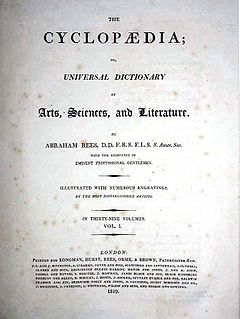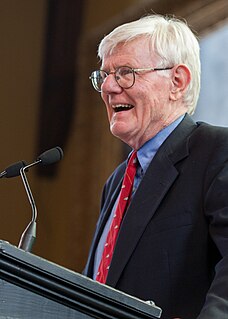
James Payn, was an English novelist. Among the periodicals he edited were Chambers's Journal in Edinburgh and the Cornhill Magazine in London.

Charles Knight was an English publisher, editor and author. He published and contributed to works such as The Penny Magazine, The Penny Cyclopaedia, and The English Cyclopaedia, and established the Local Government Chronicle.
The Colophon, subtitled A Book Collectors' Quarterly or A quarterly for booklovers, was a limited edition quarterly periodical begun late in 1929 and continuing in various guises until 1950. It was the brainchild of Elmer Adler (1884–1962), founder of Pynson Printers of New York City. His idea was that various printers around the world would be willing to contribute their time and expertise to produce signatures (articles) using their own choice of papers, typography and illustration. These articles would then be bound together in boards by Pynson Printers and marketed to 2,000 subscribers.

Rees's Cyclopædia, in full The Cyclopædia; or, Universal Dictionary of Arts, Sciences, and Literature was an important 19th-century British encyclopaedia edited by Rev. Abraham Rees (1743–1825), a Presbyterian minister and scholar who had edited previous editions of Chambers's Cyclopædia.

Gordon Stewart Wood is an American historian and university professor at Brown University. He is a recipient of the 1993 Pulitzer Prize for History for The Radicalism of the American Revolution (1992). His book The Creation of the American Republic, 1776–1787 (1969) won a 1970 Bancroft Prize. In 2010, he was awarded the National Humanities Medal.

The New Hampshire Gazette is a non-profit, alternative, bi-weekly newspaper published in Portsmouth, New Hampshire. Its editors claim that the paper, published on-and-off in one form or another since 1756, is the oldest newspaper in the United States and has trademarked the phrase "The Nation's Oldest Newspaper."

Daniel Fowle was an American printer before and during the American Revolution, and the founder of The New Hampshire Gazette.

Journalism in America began as a "humble" affair and became a political force in the campaign for American independence. Following independence, the first amendment to the U.S. Constitution guaranteed freedom of the press and speech and the American press grew rapidly following the American Revolution. The press became a key support element to the country's political parties but also organized religious institutions.
The Character and Death of Mrs. Hester Ann Rogers is a Methodist tract from 1794, still in print in 2008. The text is a publication of the sermon given by the Reverend Thomas Coke upon the death of the Methodist writer Hester Rogers, with an appendix written by her husband James Rogers; there is a third section, a “Supplement to the Appendix—consisting of Miscellaneous Extracts from the Journals of Mrs. Hester Ann Rogers.” Coke's sermon and James Rogers' appendix both contain published passages from Hester Rogers' own book entitled A Short Account of the Experience of Mrs. H.A. Rogers, Written by Herself as well as unpublished excerpts from her journals and correspondence. The history of the “Supplement to the Appendix” is not clear.

Periodical literature is a category of serial publications that appear in a new edition on a regular schedule. The most familiar example is the magazine, typically published weekly, monthly, or quarterly. Other examples of periodicals are newsletters, academic journals and yearbooks. Newspapers, often published daily or weekly, are, strictly speaking, a separate category of serial.
The Massachusetts Magazine was published in Boston, Massachusetts, from 1789 through 1796. Also called the Monthly Museum of Knowledge and Rational Entertainment, it specialized in "poetry, music, biography, history, physics, geography, morality, criticism, philosophy, mathematics, agriculture, architecture, chemistry, novels, tales, romances, translations, news, marriages, deaths, meteorological observations, etc. etc." It was intended as "a kind of thermometer, by which the genius, taste, literature, history, politics, arts, manners, amusements and improvements of the age and nation, may be ascertained." Founded by Isaiah Thomas, the magazine was also published by Ebenezer T. Andrews (1789-1793), Ezra W. Weld (1794), Samuel Hill (1794), William Greenough (1794-1795), Alexander Martin (1795-1796), Benjamin Sweetser (1796), and James Cutler (1796). It was edited by Isaiah Thomas, Thaddeus Mason Harris (1795-1796), and William Bigelow (1796). Contributors included Joseph Dennie, William Dunlap, Benjamin Franklin, Sarah Wentworth Morton, Judith Sargent Murray, and Christian Gullager. Sheet music was published with some issues, including compositions by Hans Gram.

Joseph Tinker Buckingham was an American journalist and politician in New England. He rose from humble beginnings to become an influential conservative intellectual in Boston.
Events from the year 1796 in the United States.
Events from the year 1799 in the United States.
Events from the year 1808 in the United States.

Jeremiah Gridley or Jeremy Gridley (1702–1767) was a lawyer, editor, colonial legislator, and attorney general in Boston, Massachusetts, in the 18th century. He served as "Grand Master of the Masons in North America" around the 1760s, and was associated with the founding of the Boston Bar Association.

The Weekly Rehearsal or The Rehearsal (1731–1735) was a literary newspaper published in Boston, Massachusetts, in the 1730s. Jeremiah Gridley served as editor and publisher (1731-1733); other publishers/printers included John Draper and Thomas Fleet. In 1735 it was continued by Thomas Fleet's Boston Evening Post.

The Boston Gaol (1635–1822) was a jail in the center of Boston, Massachusetts, located off Court Street, in the block bounded by School, Washington and Tremont Streets. It was rebuilt several times on the same site, before finally moving to the West End in 1822. Prisoners included Quakers, "witches," pirates, murderers, rebels, debtors, and newspaper editors.
Stephen Jones (1763–1827) was an English literary editor, best known for his revision of the Biographia Dramatica.
Edwin Benjamin Black was one of the leading scholars of rhetorical criticism. He criticized "Neo-Aristotelianism" for its lacking a larger historical, social, political, and cultural understanding of the text and for its concentrating only on certain limited methods and aspects, such as the Aristotelian modes of rhetoric: ethos, pathos, and logos. He urged critics to analyze both the motives and goals within situated cultural norms and ideologies.












